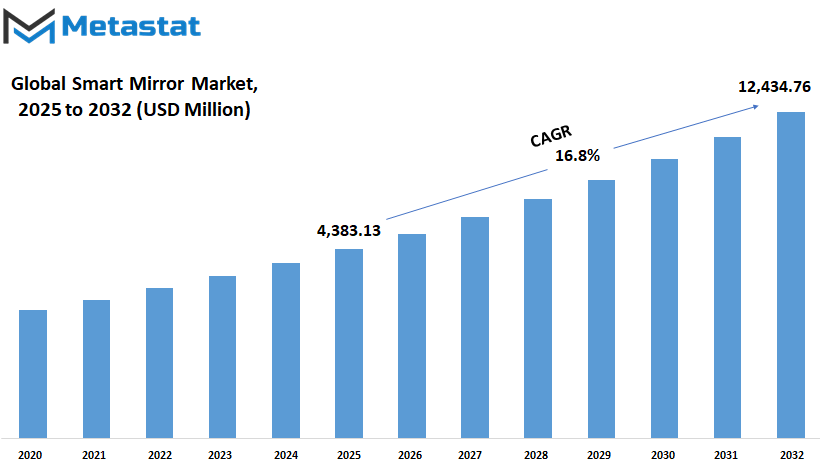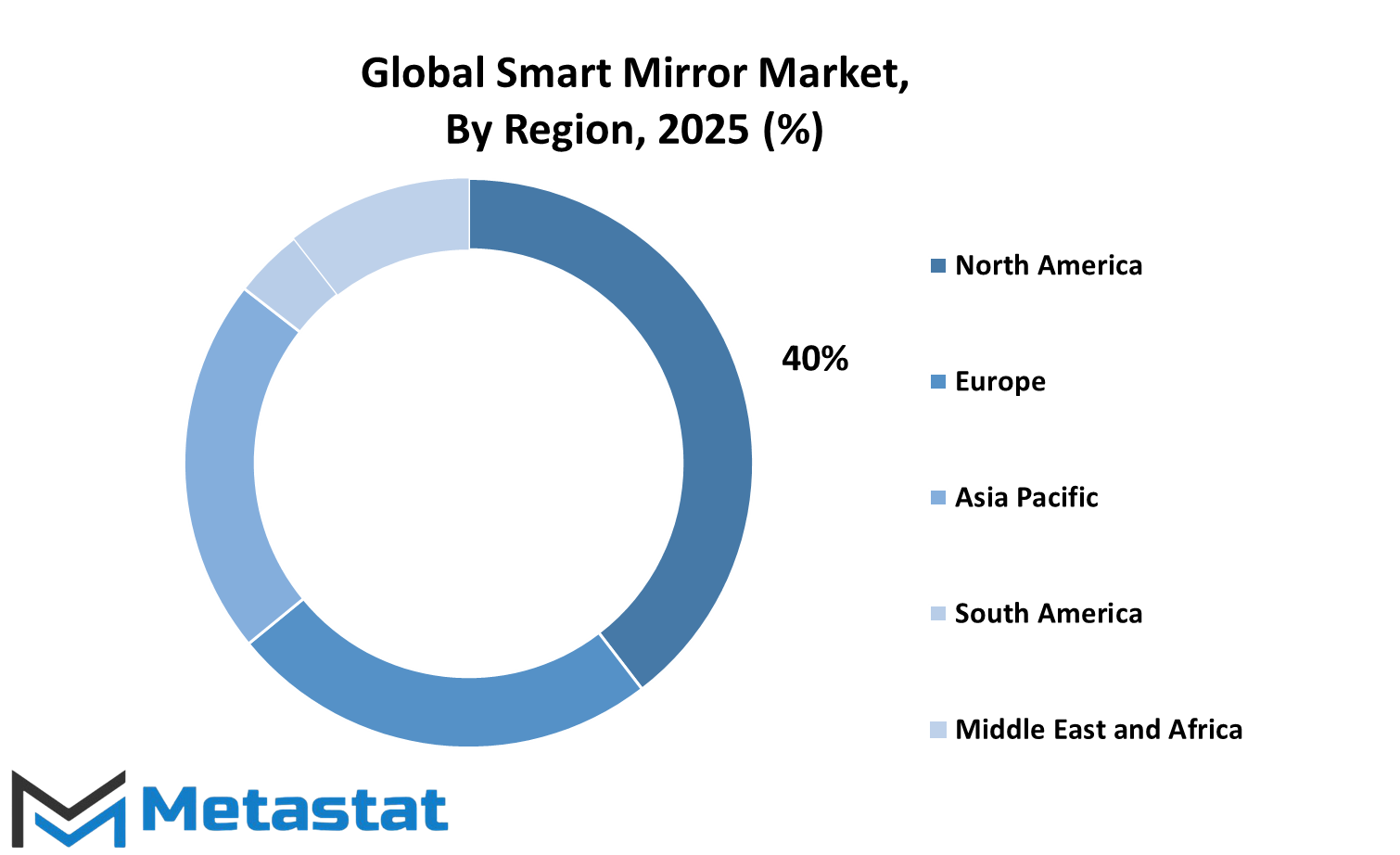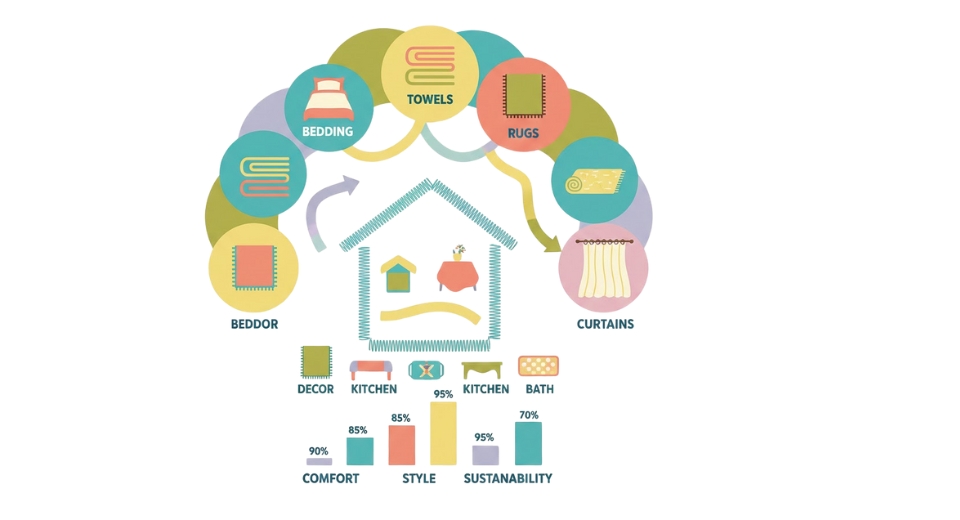MARKET OVERVIEW
The Global Smart Mirror market is an evolving direction in the technology and consumer electronics industry. A smart mirror is a type of advanced mirror equipped with features like touch screens, voice command, and connectivity with other smart devices that will further redefine consumer interaction with everything they use in their daily lives. These are mirrors with more capabilities than traditional mirrors, by integrating digital technologies that give the user any personalized information and entertainment while being in complete harmony with the smart home.
The advancement of technology will only open the gates for even more applications and capabilities for smart mirrors. Thus, more attention is likely to be paid from industries like retail, healthcare, automotive, and hospitality. In the following years, the Global Smart Mirror market is likely to be highly diversified in terms of product offerings and applications. In retail, for instance, smart mirrors will enhance the shopping experience of a customer as he or she will be able to virtually try on clothes, see different styles, and receive recommendations.
The interactive approach will improve customer engagement while streamlining the decision-making process, hence boosting sales. In the automotive sector, smart mirrors will become integral to modern vehicle design, providing drivers with enhanced safety features, real-time information displays, and integration with navigation systems. This technological integration will improve driving experiences and contribute to the development of autonomous vehicles.
Healthcare will also emerge as a key sector for the Global Smart Mirror market. Smart mirrors would be used at hospitals and even in homes for monitoring health indicators, reminding a patient of when to take medicines, and receiving virtual consultations from healthcare providers. These would enhance preventive healthcare while improving the care of patients as they encourage consistent monitoring and prompt interventions.
Also, the hospitality sector will utilize the smart mirror in order to allow guests to access customized services by way of using interactive room control, entertainment provision, and easy access to any service within a hotel from just one device. The Global Smart Mirror market shall not be constrained to the developed economies only; instead, due to increased ease of accessibility, it will permeate emerging economies as well to cater to numerous sectors.
Mass producers will design more energy-efficient and affordable products to accommodate the ever-increasing demographics of consumers. Advances in materials like lightweight, strong, and long-lasting parts will add a further edge to smart mirrors installation in residential as well as commercial areas. Also, artificial intelligence and the Internet of Things (IoT) will play an essential role in taking the revolution to the next levels for smart mirrors.
They shall teach smart mirrors the users’ preferences and needs while adjusting to the specific expectations for every individual, offering a more intuitive experience. Connections to other smart devices create cohesive ecosystems in homes and businesses, fully realizing seamlessness and efficiency for users. In the augmented reality realm, many new possibilities will be introduced in terms of the functionality of smart mirrors, making them crucial tools in education, design, and remote collaboration.
The Global Smart Mirror market is expected to be drastically transformed due to technological innovation that continues to influence product development and application areas. As its presence expands in various industries and across geographical locations, the market will play a pivotal role in defining the future of consumer interaction with digital technologies. The functionality and versatility of smart mirrors ensure that they are relevant for many years to come, thus generating demand and fostering further development in the future.
Global Smart Mirror market is estimated to reach $12,434.76 Million by 2032; growing at a CAGR of 16.8% from 2025 to 2032.

GROWTH FACTORS
The Global Smart Mirror market is expected to experience a tremendous growth in the near future, influenced by a combination of technological advancement and changing consumer preferences. With people becoming increasingly interested in smart home devices and personal technology integration, smart mirrors are gaining attention for their multifunctional features.
These mirrors are more than just simple reflective surfaces because they now host interactive displays and voice commands in addition to making it possible for them to get connected with any other smart appliances in the home. This aspect of consumer shift, especially through tech-savvy consumers, is driving steady growth in this market. Major drivers of Global Smart Mirror market primarily include the emerging demand for the innovative healthcare as well as health and fitness monitoring solutions.
The smart mirrors equipped with sensors and health monitoring features enable the users to track their fitness routine, monitor their vital signs, and even get feedback on their posture or exercise form in real-time. It speaks to the needs of those who are health conscious but do not want to spend money on additional gadgets. With the increasing awareness of personal health, more consumers are likely to perceive smart mirrors as a worthwhile addition to their homes, thus fueling the market demand.
On the other hand, the Global Smart Mirror market faces challenges in growth. High initial investment and maintenance costs are bound to discourage the potential buyers. The high technology embedded in the mirrors comes at a cost that is unaffordable for most budget-conscious consumers. Further, the continuing maintenance and probable repair charges require a lot of money and make people dither about buying.
Another critical issue with smart mirrors is privacy. Since most of these smart mirrors capture data and monitor people's behavior, it is naturally feared as to how that data is stored, accessed, or who accesses it. One of the major concerns relating to privacy would further delay the growth rate, especially in the minds of people who are worried about constant surveillance.
Despite these challenges, the Global Smart Mirror market has much promise in the future with the integration of emerging technologies such as AR and AI. It is through such novelty that customer experiences are enriched through its interactive and personalized functionalities. For example, AR would give users the capability to try virtual outfits or make-up designs and AI will allow for tailored healthcare advice through data received in real-time.
Thus, with a more defined approach and broader presence, they open up profitable business opportunities and enable smart mirrors for homes, retailers, and hospitals. Technology and consumers' expectations are continuously changing. This will make the market dynamic and full of potential.
MARKET SEGMENTATION
By Installation Type
The advancement of technology and increased demands of consumers for new home and commercial products are expected to make the Global Smart Mirror market attractive in the coming years. The market for wall-mounted smart mirrors is expected to reach USD 3,336.78 million, while that of free-standing smart mirrors is likely to be at USD 1,046.35 million by 2025. This growth pertains to the fact that people are interested in smart home devices, where a mirror is not just a reflection surface but is an interactive device that can do many things.
Smart mirrors have become a notable feature in both residential and commercial environments. At home, it offers features like virtual personal assistants, health monitoring, and connecting with other smart devices, allowing for a smooth experience of life. For example, a smart mirror attached to the bathroom wall will display the weather, calendar events, or fitness data as a user gets ready for the day. Such a convenience is a reason why these products are making their way into homes, more so as people embrace smart home technology.
Commercially, it is changing everything in retail, hospitality, and healthcare. Retail stores are using them to enhance the shopping experience by allowing customers to try on clothes virtually, reducing the need for physical fittings. Hotels are installing smart mirrors in rooms to offer guests an upgraded experience, with features like personalized greetings, entertainment options, and control of room settings. In healthcare, these mirrors can track patient health data, provide reminders for medication, and even connect with telemedicine services.
Another major growth driver of the Global Smart Mirror market is artificial intelligence and Internet of Things. As these technologies advance, smart mirrors will be more intelligent and give personal recommendations, enhance voice recognition, and interact with other smart devices better. Wall-mounted will dominate the market as it is a space-saving product and widely used in residential and commercial areas. Yet, free-standing will also increase steadily, especially in more mall and fashion environments where mobility and flexibility are major components.
Going forward, the Global Smart Mirror market is going to keep growing as the consumers and businesses come to realize the benefits of these multifunctional devices. With continuous improvement of technology and burgeoning interest from various industries, smart mirrors will soon be part and parcel of modern living and business.
By Component
The Global Smart Mirror market is growing at a rapid pace due to the continuous advancement in technology and consumer demand for smarter, more interactive devices. No longer just a fad, smart mirrors are fast becoming a necessary part of several industries such as retail, automotive, healthcare, and residential spaces. Traditional reflective surfaces combine with advanced technologies like sensors, displays, and cameras to give users a multifunctional experience that blends convenience with innovation.
The market Is segmented by component into sensors, displays, cameras, and other supporting technologies. Sensors are the most important part of smart mirrors as they detect motion, adjust brightness, and personalize user interactions. For instance, proximity sensors can automatically turn the mirror on when someone approaches, while temperature and humidity sensors provide real-time environmental data. The advanced state of sensor technology will also introduce more personalizing and efficient interaction experiences from mirrors, like automating the timing of light during the day-even real-time, live skin-analysis.
Another necessity is a form of display transformation, changing that reflective surface from a simple mirrored image into more of an interface. It allows showing such diverse information as any updates in regard to the weather, news information, events stored in a personal calendar, fitness tracking data. In the future, the smart mirror displays will most definitely be developed as OLED with better touch screen response, increased energy efficiency, and aesthetic appearance. In a couple of years, we are likely to find augmented reality-infused mirrors wherein customers can wear or apply their make-up without wasting time making unnecessary purchases in real life.
Cameras are another additional functionality that can be added to smart mirrors. This is more so in retail and automotive sectors. In the retail sector, cameras can provide customers with a 360-degree view of how clothing fits without having to try them on. In cars, smart mirrors fitted with cameras improve safety by giving better visibility and assisting in parking. As the camera technology evolves, smart mirrors will have facial recognition features to provide more secure and personalized experiences.
There are also other components, such as connectivity modules and software platforms, to the Global Smart Mirror market. These help to integrate smart home systems, voice assistants, and mobile apps. Therefore, in the future, while the same level of innovation will drive the market forward, the market will grow because it will make smart mirrors more versatile for anyone in the widest possible scope.
In the future, this global smart mirror market will expand as more industries embrace these technologies. With the addition of artificial intelligence and the Internet of Things, smart mirrors will become even more intelligent and interactive in the way we interact with our surroundings.
By Application
The Global Smart Mirror market is expected to grow exponentially over the next few years, and this is likely to be based on technological advances and increased interest in interactive, connected devices. Smart mirrors that come with such features as touchscreens, internet connectivity, and integrated sensors change the way individuals interact with mundane objects. It is no longer just a simple reflective surface, but a multifunctional device that integrates technology with convenience and meets various requirements.
Smart mirrors are becoming a marked characteristic in modern vehicles in the automotive sector. It enhances safety in driving through provision of timely information such as blind-spot detection, rear view camera displays, and navigation details. With the automotive industry shifting towards autonomous driving and focusing on improved safety standards, the demand for smart mirrors is likely to grow. The consumers want safety as well as convenience, for which smart mirrors satisfy both needs by integrating advanced features for the proper overall driving experience.
It has recently been adopted in the retail sector, through which various customers can be engaged and get proper experiences through shopping. In clothing stores, smart mirrors allow customers to virtually try on outfits without physically changing clothes. This is not only a time-saver but also provides fun, interactive shopping experience. Retailers will have benefits since they can identify the individual tastes of clients and make proper recommendations, which creates sales and drives customer satisfaction. With development in e-commerce, physical stores are finding their way to include smart technologies as above to gain a competitive edge.
In residential settings, modern homes include smart mirrors. They are installed in bathrooms and bedrooms, where they display useful information such as weather updates, news headlines, or personal schedules while performing their basic function as mirrors. Homeowners are increasingly attracted to these devices because they are convenient and part of the smart home ecosystem. The trend toward connected living spaces will likely increase the adoption of smart mirrors in residential applications.
The hospitality industry is also seeing the benefits of smart mirrors, especially in hotels and resorts that aim to provide luxury and personalized experiences. Guests can use smart mirrors to control room settings, check the weather, or even stream entertainment content. These mirrors add a modern, high-tech feel to hotel rooms, attracting tech-savvy travelers and setting establishments apart from competitors.
In healthcare, smart mirrors are explored for their potential to support patient care and wellness. They can help monitor health conditions by tracking vital signs and reminding patients of medication. For those who are fitness-oriented, smart mirrors can guide workouts and track progress, making them useful tools in both clinical and home healthcare environments.
Such vast applications are believed to fuel growth in the Global Smart Mirror market, as it will seek much more integrated technology-driven solutions, and with its advancement, there will be ever-growing involvement in everyday life that will shape technology’s future both in homes and businesses.
By Distribution Channel
The market for Global Smart Mirror is growing at a fast pace and is expected to continue in the near future. With developments such as touch screens, internet connectivity, and artificial intelligence, smart mirrors are gradually changing both personal and commercial spaces. They enrich retail shopping, modernize home décor, and are an integral part of the digital future.
One of the key drivers for this market is the increasing demand for personalized, tech-enabled experiences. Consumers are seeking products that simplify daily routines and provide a touch of luxury and innovation. Smart mirrors fit perfectly into this need, offering features such as virtual try-ons for clothes and makeup, displaying weather updates, and even providing health insights by tracking physical conditions. Smart mirrors will be further developed as technology advances and are incorporated into smart homes and commercial spaces.
As far as reaching the consumers is concerned, the Global Smart Mirror market can be classified based on distribution channels into online and offline categories. The online category is expanding rapidly with e-commerce sites gaining popularity due to ease of usage. Consumers love the convenience of searching through many models, feature comparisons, and customer reviews ahead of making a purchase-all from the comfort of their homes. Augmented reality in online shopping allows potential buyers to preview how a smart mirror will look and function in a given space, and that’s part of the rush of online sales.
The offline segment is still important, especially in markets where consumers want to touch and feel before buying high-tech products. Physical stores allow customers to interact with smart mirrors, see their features in action, and get guidance from knowledgeable staff. Retailers that offer these experiences can build trust with consumers, leading to higher in-store sales. With the advancement of technology, offline retail stores will also be seen to include smart mirrors in their sales process, thereby providing an immersive, engaging shopping experience for customers.
Though the Global Smart Mirror market will continue to thrive both in the online and offline channels, the blurring of these lines is often known as omnichannel retailing, which will define the next levels of growth. Consumers will expect seamless shopping from online to in-store where they can seamlessly switch from researching on the web to interacting in-store. The market for smart mirrors will continue and expand as large firms invest in both channels of engagement.
|
Forecast Period |
2025-2032 |
|
Market Size in 2025 |
$4,383.13 million |
|
Market Size by 2032 |
$12,434.76 Million |
|
Growth Rate from 2025 to 2032 |
16.8% |
|
Base Year |
2024 |
|
Regions Covered |
North America, Europe, Asia-Pacific, South America, Middle East & Africa |
REGIONAL ANALYSIS
The Global Smart Mirror market is going to grow considerably in the future years, primarily driven by the technological advancements and consumer interest in connected devices. From a regional perspective, this market analysis for each area reveals different opportunities and challenges that will shape the future of smart mirrors.
In North America, the United States is considered a growth leader for it highly concentrates on innovation and has generally adopted the smart home concept. A high disposable income among consumers with major tech companies definitely boosts the demand for smart mirrors. The growth rate in these regions, however, is slower than that of the U.S. The market will also expand in such countries with greater awareness among their consumers, about the advantages smart mirrors have on offer in terms of benefits towards retail and health care.
Many countries in Europe also show higher demand for such a product, like UK, Germany, France, and Italy. The region is known for energy efficiency combined with smart living, aligning well with features offered by smart mirrors. For instance, Germany is already one of the countries leading in technology worldwide and has smart home innovation at its center. The UK and France further drive growth in the market, since people are shifting more to cities and living there due to reasons such as modern connected lifestyles. And once the rest of Europe catches up, demand in residential and commercial setups is bound to be higher for smart mirrors.
Coming to the Asia-Pacific region, some of the most influential contributors to this market are China, Japan, South Korea, and India. China and Japan are known for high growth in technologies; the consumers' acceptance of new gadgets that provide higher convenience to make life more convenient is ready. South Korea with the tech-savvy population, as well is heavily contributing to this market. India may have just about started its journey but, for sure, has great potential because India's growth of the middle class and their inclination toward smart technology are on the increase. Improvements in infrastructure of the region should drive the demand for smart mirror market.
For South America, Brazil and Argentina are key players in the market. While the market space is still young, economic forces and the technological adaptation levels shall slow down this growth, increasing awareness for such smart home device will eventually place a demand order in this market.
Last but certainly not least, the Middle East & Africa seems to be very full of promise, especially in all the GCC states with their gateway of modernity, such as the UAE and Saudi Arabia. In South Africa and Egypt, smart mirrors can hope for more opportunities with an increased level of accessibility of the technology.

COMPETITIVE PLAYERS
With technology continuously changing life, the Global Smart Mirror market promises huge growth. Smart mirrors are no longer a novelty, an addition to traditional mirrors that now incorporate digital displays and connectivity features. They find themselves essential in as diverse an array of areas as residential and commercial spaces, healthcare, and automotive. Some of these features include the display of weather updates, news, calendars, and health metrics, in a seamless blend of utility and innovation.
Because the smart home device is on an upward trend in popularity, customers continue to make investments in a smart mirror. Such a gadget makes them incredibly appealing since personal information, entertainment, and virtual assistants can easily be included inside mirrors. Users can, for instance, catch the news or check schedules in the bathroom as they prepare to leave while athletes can view how many steps they have walked in a week by using their mirrors. Demand is, however not limited to homes. Retail stores, salons, and hospitality sectors are finding their way in using smart mirrors to make customer experience more sophisticated. For example, in retail, they can offer virtual try-on features, allowing customers to see how clothes or accessories look without physically trying them on.
The Global Smart Mirror market is highly competitive, with numerous key players driving innovation. Companies like Lumi, HiMirror, Kohler, and Seura are continuously enhancing their product offerings to stay ahead. It focuses on the companies that take care to integrate advanced features like touchless controls, voice recognition, and artificial intelligence to offer the best interaction with users. In addition to these giants, some specialist firms, such as Smart Mirror Dental and actiMirror, are tailoring smart mirror technology for small markets, such as dental practices and personal healthcare.
Automotive companies like Gentex Corp. are integrating smart mirrors into vehicles, providing drivers with better rearview, blind-spot detection, and real-time navigation updates. Japan Display Inc. and Vercon Smart Mirror are also making a new definition of smart mirrors by bringing out newer technological innovations in the field of these mirrors. Smart mirrors, combining augmented reality with superior display technologies, are definitely going to make this world more interactive and personalized for the masses.
Companies such as Evervue USA Inc., Capstone Turbine Corporation, and HILO Solutions, Inc., are making the smart mirror usable in every sector and diversified applications. With further growth in the Global Smart Mirror market and further competition, innovation will be fueled and lead to more intelligent, efficient, and highly interactive products as will aptly define the way people interact with mirrors in their everyday lives.
Smart Mirror Market Key Segments:
By Installation Type
- Wall Mounted
- Free-Standing
By Component
- Sensors
- Displays
- Camera
- Others
By Application
- Automotive
- Retail
- Residential
- Hospitality
- Healthcare
- Others
By Distribution Channel
- Online
- Offline
Key Global Smart Mirror Industry Players
- Lumi
- HiMirror
- Kohler
- Seura
- Smart Mirror Dental
- Eone
- Dyfo Automation Pvt. Ltd.
- Capstone Turbine Corporation
- HILO Solutions, Inc
- ad notam
- XPO screens
- Vercon Smart Mirror
- Evervue USA Inc.
- Gentex Corp.
- Japan Display Inc.
WHAT REPORT PROVIDES
- Full in-depth analysis of the parent Industry
- Important changes in market and its dynamics
- Segmentation details of the market
- Former, on-going, and projected market analysis in terms of volume and value
- Assessment of niche industry developments
- Market share analysis
- Key strategies of major players
- Emerging segments and regional growth potential








 US: +1 3023308252
US: +1 3023308252






